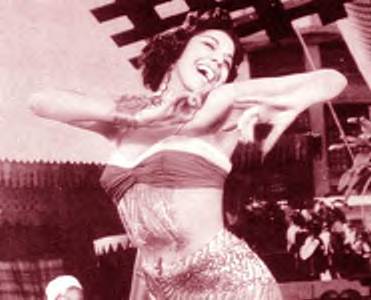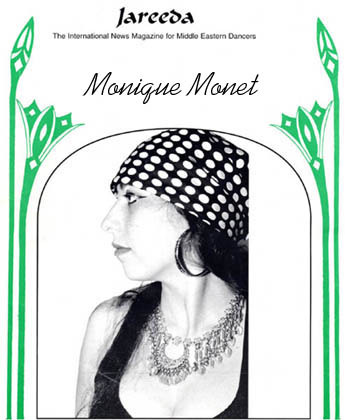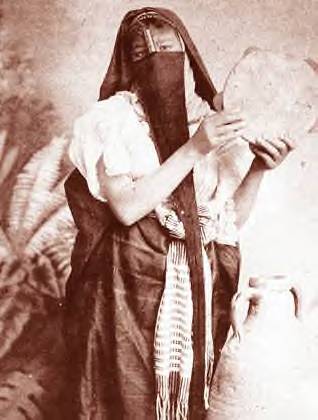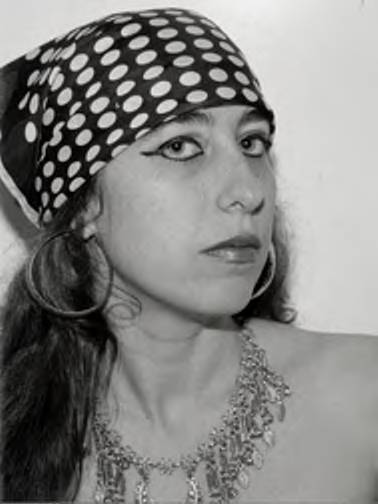|
|
 |
 |
 |
 |
|
Monique Monet's Revolutionary Dance By Kay Seven, M.S. |
|
|
(Originally published in Jareeda Magazine) |
|
 |
 |
|
How many times have
you felt vaguely apologetic for not being an eternal Barbie Doll? Hollywood and MTV often seem to cast an intentional shadow over the more subtle and truthful beauty of real life. |
 |
 |
|
Motivated by both profit and long habit, there are those who work hard every day to keep you constantly
aware of the many ways in which you fall short of their ever-changing fictional/fantasy standards of feminine beauty and fulfillment. |
 |
 |
|
You and I have to constantly try and remind ourselves that, as dancers and as women, we can't
allow Hollywood to take us for a ride up their gold-paved (but dead-end) road. One very powerful "reminder" is Monique Monet's Revolutionary Dance. This film
kicks the media spin doctors and commercial con artists right out the door - - and puts you back in the driver's seat. Whether regarding Middle Eastern Dance or your own personal
empowerment, Revolutionary Dance brings experienced-based reality into painfully sharp focus. Bottom line: It's your dance, your life - - and you're the boss! |
|
|
|
|
 |
 |
|
Revolutionary Dance
addresses the increasingly complex question: What exactly is contemporary Middle Eastern Dance? Is it a women's bonding activity? A rhythmic exercise for childbirth? Sexy cabaret show-biz? A handy small business opportunity (teaching and belly grams)? Is Middle Eastern Dance the shoddy little cousin of ballet? Or is it a pure art form in itself? Is it an ethnic treasure (can only born-and-raised Middle Eastern women truly understand the dance)?
|
|
 |
 |
|
Or, is "contemporary Middle Eastern Dance" a complete American invention of the 60's and 70's?
|
 |
 |
|
Monique Monet's Revolutionary Dance answers all of these questions, and more.
Midway in the film the tone turns introspectively biographical as (via an excerpt from a phone interview) Monique, of Syrian/Romani heritage, describes growing up as a dark
("secret" Gypsy) presence in the bright blonde Disneyland that was Southern California. She goes on to critique the current "Gypsymania" increasingly present in the world of Bellydance.
Beware of vendors, she warns, peddling "Gypsy Dance" a.k.a. Rom, Romi, Domi, or Romani Dance. In almost all instances it is a romantic fabrication of the instructor's imagination. |
|
|
 |
 |
|
"And there's nothing wrong with the name Gypsy," she adds, " as long as you spell
it with a capital "G"." |
|
|
 |
 |
|
More than anything else, Monique Monet's Revolutionary Dance
is an invaluable guide to "dancing from the inside out." Middle Eastern Dance can be a creatively beautiful art form; a potent ritual for personal empowerment, and more.
But first the dancer must claim her dance for herself. "It's guaranteed certain that you (as a dancer and as a human being) will never please everybody. So face that fact. Get
over it. And then, asking no one's permission, allow yourself to mature and blossom |
|
 |
 |
|
into the uniquely beautiful and powerful performer that only you can become.."
Monique Monet's Revolutionary Dance is a strange, unpredictable, homey, and very funny production. It's definitely one of a kind. And it's a pleasure to watch. |
|

























